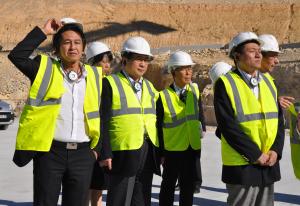Japanese MPs intent on promoting ITER
The Japanese House of Representatives has recently decided to set up a commission to investigate the causes of the Fukushima nuclear plant accident.
In order to do so, a ten-member high-level delegation of House members, headed by Representative Yorihisa Matsuno, was sent around the world to meet experts in the field of nuclear energy and visit different sites and institutions.
ITER was an important stop in the Japanese Representatives' mission as they wished to assess the current status of fusion research and the perspectives that the ITER Project will open for the future of energy worldwide.
Early Tuesday, 11 October, the delegation arrived in Cadarache and spent the better part of the day discussing with ITER Organization Director-General Osamu Motojima and senior management, and also visiting the ITER site.
The Representatives, whose future decisions will contribute to the shaping of Japanese energy policy and to the continued investment in fusion, had many questions for the ITER management. "When would fusion energy be commercially available?" "What will be the cost of a post-ITER industrial demonstrator?"
These questions are difficult to answer because they depend for a large part on the political determination and commitment of the nations involved in present and future fusion projects. However, DG Motojima stated that 2040-2050 was a reasonable horizon for an operational pre-industrial reactor, and that the cost of such an installation would be about twice that of a conventional fission reactor.
As they toured the ITER work site, the Japanese Representatives took full measure of ITER's progress. Standing in the Tokamak Seismic Pit and watching the ongoing work is always a powerful experience ... and one that helps to understand the scope and stakes of the project.
That experience, combined with everything learned during the half-day visit, convinced the Japanese Representatives to form a special group within the House in order to support and promote ITER.


